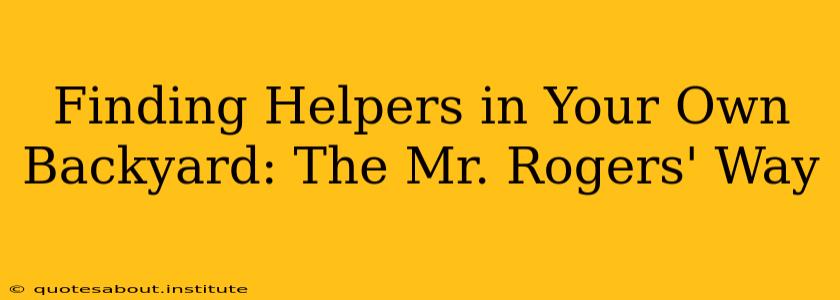Fred Rogers, the beloved host of Mister Rogers' Neighborhood, wasn't just a purveyor of gentle songs and puppets. He was a profound influence on generations, teaching children about empathy, kindness, and the importance of community. His philosophy extended beyond the television screen, offering a powerful message about finding help and support within our own neighborhoods, a concept as relevant today as it was decades ago. This approach, rooted in genuine connection and mutual respect, is a far cry from the impersonal nature of many modern services, offering a refreshing and effective alternative.
What Did Mr. Rogers Mean by "Neighborhood"?
Before delving into practical applications, let's clarify what Mr. Rogers meant by "neighborhood." It wasn't just the houses lining your street. For Mr. Rogers, the neighborhood encompassed the entire web of relationships and support systems surrounding an individual. This included family, friends, neighbors, community organizations, and even the broader societal structures that offer assistance. His message highlighted the power of these interconnected relationships, emphasizing the importance of nurturing them to build strong, resilient communities.
How can I find help in my community?
This is a crucial question, and the answer lies in actively engaging with the resources available around you. Start by identifying your needs. Are you seeking childcare support, assistance with errands, emotional support, or something else entirely? Once you have a clear understanding of your requirements, you can begin to explore local resources.
What resources are available in my neighborhood?
Many communities offer a wealth of untapped resources. These could include:
- Local churches and community centers: These often provide assistance programs, support groups, and volunteer opportunities.
- Neighborhood watch groups: While primarily focused on safety, these groups can also foster a sense of community and mutual support.
- Senior centers: These aren't just for older adults; many offer programs and services benefiting people of all ages.
- Local libraries: Libraries often host workshops, events, and support groups. They also provide access to information and resources.
- Schools and parent-teacher associations: These can be excellent sources of support and connection, especially for families with children.
- Volunteer organizations: Numerous organizations rely on volunteers and often offer opportunities for reciprocal support within the community.
Where can I find reliable information about community resources?
Finding reliable information is key to accessing community support. Excellent resources include:
- Your local government website: Most municipalities have websites outlining available services and programs.
- United Way: This organization acts as a clearinghouse for information on local social services.
- Local newspapers and community bulletin boards: These can highlight local events, programs, and volunteer opportunities.
How can I build stronger relationships with my neighbors?
Building strong relationships with your neighbors is fundamental to accessing the Mr. Rogers' style of support. Simple acts of kindness and connection can go a long way:
- Introduce yourself: A simple "hello" can spark a conversation and build rapport.
- Offer help: Assisting a neighbor with groceries or yard work can foster a sense of mutual support.
- Participate in community events: Attending local events is a great way to meet people and build connections.
- Organize a neighborhood gathering: A potluck or game night can create opportunities for socializing and building community bonds.
The Mr. Rogers Approach: A Holistic View of Help
Mr. Rogers' philosophy transcends simply finding practical assistance. It's about building relationships based on empathy, understanding, and mutual respect. This means actively listening to those around you, offering support without judgment, and appreciating the unique contributions of each individual within your community. This holistic view extends to both giving and receiving help, fostering a sense of reciprocal responsibility and shared well-being.
By actively engaging with your neighborhood and building meaningful connections, you can cultivate a strong support network, mirroring the spirit of Mr. Rogers' compassionate vision. This approach not only provides practical assistance but also cultivates a sense of belonging, resilience, and shared humanity. It's about building a true neighborhood—a community where everyone feels seen, valued, and supported.

